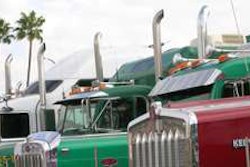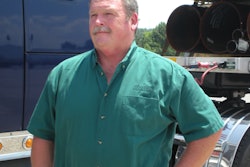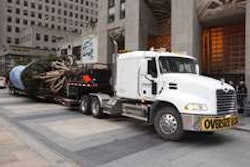The California Air Resources Board will consider a new provision in April to provide truckers more flexibility in cleaning up diesel emissions under the state’s Truck and Bus Rule because the recession has resulted less trucking work which, in turn, yielded in cleaner air.
At its Dec. 9 meeting, CARB said its staff has demonstrated that the down economy has cut truck operating time, thus reducing emissions. It heard how the recession was affecting California’s trucking industry, including that:
- There had been no growth in the number of registered trucks since 2007.
- In October, Port of Los Angeles/Long Beach container traffic fell 26 percent, while Port of Oakland container traffic dropped 17 percent .
- Recovering for the state’s trucking is expected to start next year and truck sales are forecast to begin rebounding in 2012, with modest growth through 2014.
During a Dec. 3 stakeholders’ workshop, fleet representatives said their vehicles traveled fewer miles and depressed revenues hurt their ability to comply with new rules. Health organizations maintained the Truck and Bus Rule is needed for health benefits.
The staff said implications of stakeholder input and other findings is that board members could consider reduced diesel emission requirements in immediate upcoming years, but deferred actions would need to be compensated for by 2014. More assessment and input is needed, they said.
The board also directed staff to withdraw and redo the health report with Hien Tran’s name after learning last year he falsely claimed he held a Ph.D. in statistics. They will continue to implement the report during this period. The board did not second a motion by member John Telles, who wanted to repeal the diesel rule after learning of Tran’s misconduct.

“With today’s set of actions, we confidently set out to revalidate the science supporting our rules and set up a process to allow for more flexibility for small businesses in the regulation given the down economy,” says Mary Nichols, CARB chairman. “We take the employee misconduct very seriously, but it should not affect an extremely important public health measure that has been extensively reviewed throughout the scientific community. We have tightened up our procedures to ensure an incident like this never happens again.”
CARB suspended Tran 60 days without pay, demoted him two levels to air pollution specialist in the Population Studies Section of the Research Division and he no longer does regulatory support work, according to CARB spokesman Leo Kay.
The full board was not informed of Tran’s misrepresentation of his credentials because his report was one of many health documents used to support the diesel truck regulation, Kay said.
Board officials described Tran’s contributions this way in its April action against him: “Because of your dishonesty, and as the lead author on a critical report, titled ‘Methodology for Estimating Premature Particulate Matter in California,’ and the rules and regulations it directly affects, ARB’s credibility has been called into question.”
Kay said in retrospect, the full board should have been notified as CARB officials were aware of his misconduct. “We are instituting practices to make sure that we share all pertinent information with board members in the future on issues that may affect how they vote on ARB measures,” Kay said.
Jim Johnston, president of the Owner-Operators Independent Driver Association, wrote a letter Dec. 4 to CARB and Gov. Arnold Schwarzenegger requesting a rule delay, but not just because of the Tran scandal. The board has granted some relief to truckers unable to meet their deadlines for some reefer haulers and port truckers, and CARB should do the same under the Truck and Bus Rule, he said.









